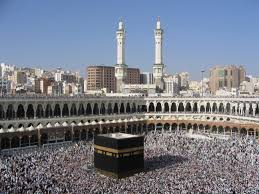PLACES WHERE DUAS ARE ACCEPTED DURING HAJJ AND UMRAH

While the entire city of Makkah is sacred and filled with divine blessings, there are certain places—highlighted in Islamic tradition—where supplications (duas) are especially accepted. These sites, mostly located within Masjid al-Haram, hold profound spiritual significance. The following list is compiled with reference to the renowned book Ahsan-ul-Wi’a li Adab-id-Dua, to help pilgrims offer their duas with awareness, humility, and deep devotion.
1. Mataf
Mataf is the open area surrounding the Holy Kaaba where pilgrims perform the Tawaf (seven circuits around the Kaaba). This space is highly blessed, and it is widely believed that sincere duas offered here are accepted.
2. Inside the Holy Kaaba
The interior of the Kaaba is considered the most sacred spot in all of Islam. However, it is only opened a few times a year for cleaning by the royal authorities. Nonetheless, being near the Kaaba and facing it while making dua holds immense spiritual value.
3. Multazim
Multazim refers to the area between the Kaaba’s door and the Black Stone (Hajar al-Aswad). It is a special place for heartfelt confessions and seeking Allah’s forgiveness.
4. Mizab al-Rahmah (The Gutter of Mercy)
Located on the roof of the Kaaba, this golden spout drains rainwater from the roof. Standing beneath it and supplicating is highly recommended, as it is considered a place of mercy and acceptance.
5. Hatim (Hijr Ismail)
This semi-circular area adjacent to the Kaaba is regarded by the Prophet Muhammad (PBUH) as part of the Kaaba itself. Offering prayer and making dua here is akin to doing so inside the Kaaba.
6. Rukn al-Yamani
One of the four corners of the Kaaba, Rukn al-Yamani is a special place where pilgrims should make dua as they pass during Tawaf. It is a Sunnah to touch it if possible.
7. Maqam Ibrahim
Situated near the Kaaba, Maqam Ibrahim is where Prophet Ibrahim (AS) stood while constructing the Kaaba. It is instructed in the Qur’an to perform two rak’ahs of prayer here after completing Tawaf, followed by making dua.
8. Near the Zamzam Well
Although the well itself is no longer physically accessible due to renovations, pilgrims can drink the blessed Zamzam water throughout the Haram. Making dua after drinking Zamzam with intention is highly encouraged.
9. Safa and Marwah
These two hills, now enclosed within Masjid al-Haram, are symbolic of the devotion of Hajar (RA) in search of water for her son Ismail (AS). Duas made during the Sa’i (ritual walk between them) are greatly blessed.
10. Plains of Arafat
The Day of Arafah (9th Dhul Hijjah) is the most significant day of Hajj. Standing in Arafat and making dua is among the greatest acts of worship. The Prophet (PBUH) declared this the pinnacle of Hajj.
11. Mina
Mina is the tent city where pilgrims stay during the days of Hajj. It is a place of reflection and seeking forgiveness, especially during the ritual of stoning the Jamarat.
12. Muzdalifah
Spending the night in Muzdalifah is a key part of Hajj. After collecting pebbles for the next day’s rites, pilgrims are encouraged to make dua under the open sky.
13. First Glance at the Kaaba
According to Imam Abu Hanifa, the very first sight of the Kaaba holds a special status—duas made at that moment are accepted.
14. Masjid an-Nabawi (The Prophet’s Mosque)
Located in Madinah, this is the mosque of the Prophet Muhammad (PBUH), where he spent the latter part of his life. Duas made here carry immense blessings, especially in the Rawdah (the area between the Prophet’s house and pulpit).
15. Sacred Spots Within Masjid an-Nabawi
Certain places within Masjid an-Nabawi are considered especially significant for dua, such as near the Prophet’s Pulpit (Mimbar), the Golden Grille, and the blessed columns known to have been present during his time.
16. Masjid Quba
This is the first mosque built in Islam. The Prophet (PBUH) said that praying two rak’ahs in Masjid Quba is equivalent in reward to an Umrah.
17. Masjid al-Fath
One of the Seven Mosques in Madinah, Masjid al-Fath is where the Prophet (PBUH) is known to have prayed for three days during the Battle of the Trench. Duas made here, particularly between Dhuhr and Asr on Wednesdays, are said to be accepted.
18. Mount Uhud
This mountain, loved by the Prophet (PBUH), is the site of the famous Battle of Uhud. Visiting Mount Uhud, honoring the martyrs, and making dua here are deeply spiritual act.
3SixtyIslam is a one stop home for everything Islamic, we handle your Hajj and umrah travels too.When next you are planning to go on hajj or umrah , 3SixtyIslam is your sure agent for convinient and affordable pilgrimage For more details, please call or WhatsApp on +2348155577038 (‘Leke Yusuf)

